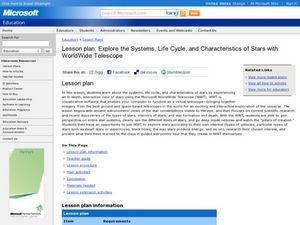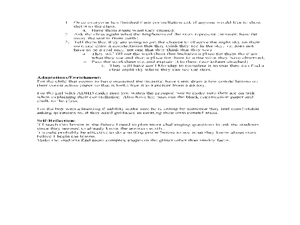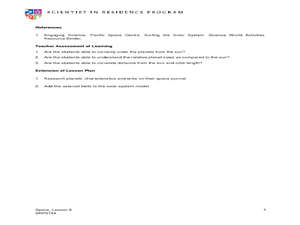Curated OER
The Sun
Students draw diagram of sun and its layers, including photosphere, chromosphere, corona, convection and radiative zones, and core. Students then describe each layer in their own words, define sun spot cycle, and describe solar flares.
NASA
Star Brightness
In this brightness of stars worksheet, high schoolers answer 7 questions about the apparent magnitudes of stars, the sun, and the moon. They compare the brightness of stars, galaxies, astronomical objects and the sun.
Curated OER
A Star is Born
Learners research the life cycle of a star. In this astronomy lesson, students work in groups to research on stage in stellar evolution and report back to the class their findings. They will discuss as a class the order of the stages and...
Curated OER
Explore the Characteristics of Stars with Microsoft WorldWide Telescope
Students explore the characteristics of stars. In this space science activity, students use the Microsoft WorldWide Telescope program to identify the properties of stars and identify the stars in the galaxy.
Curated OER
Solar Kit Lesson #7 - Positioning Solar Panels I: Explorations with Tracking
In this first part of a two-part lesson, learners track and record the sun's azimuth using a solar panel. They graph and analyze the data to identify relationships among the time of day, the altitude and azimuth of the sun, and the...
Curated OER
Solar Kit Lesson #9 - Properties of Solar Radiation: Reflection, Transmission, and Absorption
Middle school science stars observe and record data on the solar radiation reflected off or transmitted through various materials. They predict properties for various materials, and test their predictions by touch. This lesson becomes...
Curated OER
The Relative Sizes of The Sun and Stars
In this relative sizes of the sun and stars instructional activity, students determine the relative sizes of the Earth, Jupiter, the Sun and other stars. Students compare the size of stars given ratios of one star to another.
Curated OER
The Sun and Moon
Students understand basic concepts about Earth, the Sun and the Moon,
such as relative movement and the phases of the moon. Through discussion, looking at pictures, listening to Native American stories, observing, and building models,...
Curated OER
Size of Stars
Fifth graders draw constellations in the sky and use the brightness levels of stars to show how big they are. In this constellations lesson plan, 5th graders describe what they see in the night sky by discussing the star's distances.
Curated OER
Twinkle, Twinkle, Little Star Lab
In this space science worksheet, 7th graders use the star circles given but the teacher to complete 14 short answer questions. They plot the stars on the graph.
Curated OER
Space: Our Star, the Sun, and Its Friends, the Planets
Students examine the solar system. In this space lesson, students identify the order of the planets and their relative size to the sun. Students create a scale model of our solar system using a variety of household objects.
Curated OER
Star Light, Star Bright: Exploring How Stars are Classified
In this star classification worksheet, students are given laminated star charts to make observations about stars. They work in groups to classify groups of stars based on different characteristics. For each group of stars they list at...
Curated OER
Demonstrating the Distances of Stars
Students examine the distance from Earth to stars. They create a model to show the arrangement of constellations. They also identify the importance of the parallax effect.
Curated OER
Timekeeping by the Sun
Students measure shadows to learn about the Sun-Earth relationship. In this astronomy lesson, students create a shadow stick of a Pokemon character and record measurements of its shadow in a data chart. Follow-up discussions guide...
Curated OER
Measuring Star Temperatures
For this measuring star temperatures, students find the temperature of a star using Planck's curve and the Wein Displacement law. Students also find the peak wavelengths for given stars using Planck's curve.
Curated OER
The Solar System: Go Green with the Sun!
Third graders learn how to use solar power. In this sun, technology and energy lesson, 3rd graders learn how the solar power from the sun can give off energy, learn about solar panels, discuss their uses and benefits, and design a solar...
Curated OER
Sun Activity
For this space science worksheet, middle schoolers find the answers to the questions concerning the topic of the sun and they label the diagram for the sun.
K5 Learning
Sun, Stars and Moon
Learners read about the objects we see in our night and day skies before answering five short answer comprehension questions.
Curated OER
How Hot is that Star?: Astronomy, Sun, Solar Temperature, Science
Young scholars explain sun facts and solar information. They discover how temperature of a star is measured. They investigate the various scales used to measure temperature. They observe images of the sun. They classify stars according...
Mr. E. Science
Stars, Galaxies and the Universe
It takes 225 million years for our sun to travel around the galaxy. The presentation covers astronomical units, light years, telescopes, types of stars, the life cycle of a star, and types of galaxies. This is the last lesson in a...
Curated OER
The Earth and Beyond
Photographs and graphics bring the solar system and Earth to life in this presentation. Viewers are taken on a virtual field trip, beginning with the sun and planet placement, and proceeding through both Earth and the moon's movements....
Curated OER
Notes: Characteristics of Stars
Students investigate stars and the solar system by completing a worksheet. In this space science lesson, students complete a fill in the blank worksheet based on the stars and components of the cosmos.
Starry Night Education
The Year and Seasons
Turn your classroom into a live demonstration of how the earth and sun interact to create the four seasons. Using a globe, a light source, and a series of constellation cards, super scientists discover how the motion of these...
EngageNY
The Motion of the Moon, Sun, and Stars—Motivating Mathematics
What does math have to do with the behavior of the earth and sun? Learn how the movement of celestial bodies has influenced the development of trigonometry. Scholars connects the details in mathematics to their real-world meaning.
Other popular searches
- Sun and Stars
- Sun and Stars Diagram
- The Sun and Stars
- Sun Moon Stars
- Moon, Sun and Stars
- Sun and Stars Powerpoint
- Moon Sun and Stars
- Sun and Stars Webquest
- Sun and Stars Web Quest
- Sun, Moon, Stars
- Sunflower Stars
- Sun, Moon and Stars

























